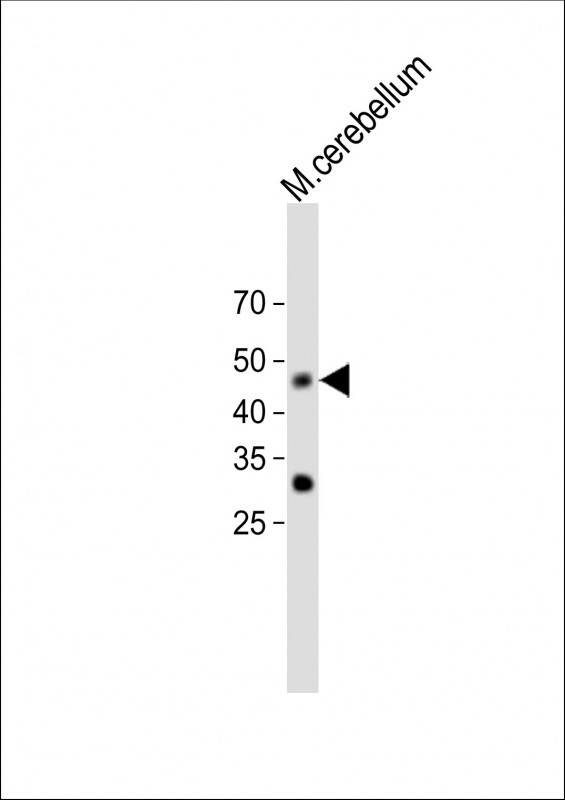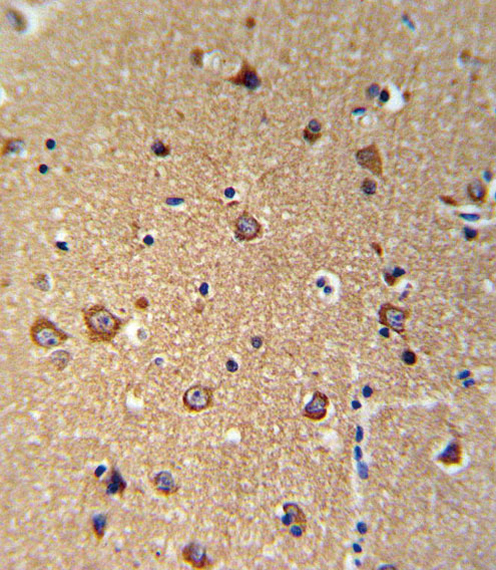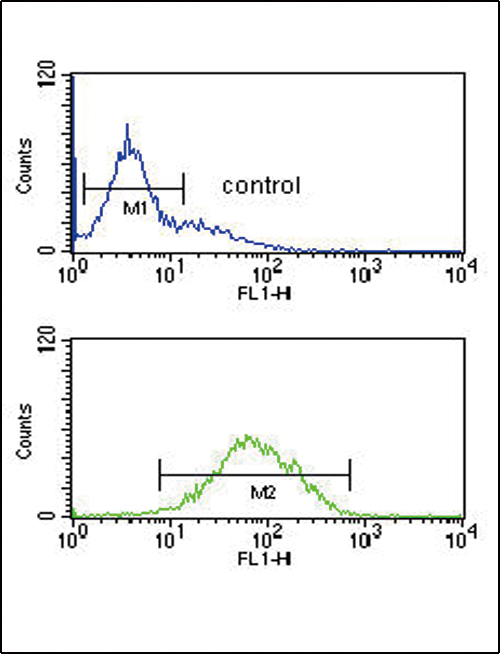ANKH Antibody (C-term)
Affinity Purified Rabbit Polyclonal Antibody (Pab)
- 产品详情
- 实验流程
- 背景知识
Application
| WB, IHC-P, FC, E |
|---|---|
| Primary Accession | Q9HCJ1 |
| Other Accession | P58366, Q9JHZ2 |
| Reactivity | Human, Mouse |
| Predicted | Rat |
| Host | Rabbit |
| Clonality | Polyclonal |
| Isotype | Rabbit IgG |
| Calculated MW | 54241 Da |
| Antigen Region | 464-492 aa |
| Gene ID | 56172 |
|---|---|
| Other Names | Progressive ankylosis protein homolog, ANK, ANKH, KIAA1581 |
| Target/Specificity | This ANKH antibody is generated from rabbits immunized with a KLH conjugated synthetic peptide between 464-492 amino acids from the C-terminal region of human ANKH. |
| Dilution | WB~~1:2000 IHC-P~~1:100~500 FC~~1:10~50 E~~Use at an assay dependent concentration. |
| Format | Purified polyclonal antibody supplied in PBS with 0.05% (V/V) Proclin 300. This antibody is prepared by Saturated Ammonium Sulfate (SAS) precipitation followed by dialysis against PBS. |
| Storage | Maintain refrigerated at 2-8°C for up to 2 weeks. For long term storage store at -20°C in small aliquots to prevent freeze-thaw cycles. |
| Precautions | ANKH Antibody (C-term) is for research use only and not for use in diagnostic or therapeutic procedures. |
| Name | ANKH {ECO:0000303|PubMed:35147247, ECO:0000312|HGNC:HGNC:15492} |
|---|---|
| Function | Transports adenosine triphosphate (ATP) and possibly other nucleoside triphosphates (NTPs) from cytosol to the extracellular space. Mainly regulates their levels locally in peripheral tissues while playing a minor systemic role. Prevents abnormal ectopic mineralization of the joints by regulating the extracellular levels of the calcification inhibitor inorganic pyrophosphate (PPi), which originates from the conversion of extracellular NTPs to NMPs and PPis by ENPP1 (PubMed:20943778, PubMed:32639996, PubMed:35147247). Regulates the release of the TCA cycle intermediates to the extracellular space, in particular citrate, succinate and malate. Extracellular citrate mostly present in bone tissue is required for osteogenic differentiation of mesenchymal stem cells, stabilization of hydroxyapatite structure and overall bone strength (PubMed:32639996). The transport mechanism remains to be elucidated (Probable). |
| Cellular Location | Cell membrane; Multi-pass membrane protein |
| Tissue Location | Found in osteoblasts from mandibular bone and from iliac bone; not detected in osteoclastic cells |
For Research Use Only. Not For Use In Diagnostic Procedures.
Provided below are standard protocols that you may find useful for product applications.
BACKGROUND
ANKH is a multipass transmembrane protein that is expressed in joints and other tissues and controls pyrophosphate levels in cultured cells. Progressive ankylosis-mediated control of pyrophosphate levels has been suggested as a possible mechanism regulating tissue calcification and susceptibility to arthritis in higher animals.
REFERENCES
Wang, J., et al. J. Rheumatol. 36(6):1265-1272(2009)
Ho, A.M., et al. Science 289(5477):265-270(2000)
Rojas, K., et al. Genomics 62(2):177-183(1999)
终于等到您。ABCEPTA(百远生物)抗体产品。
点击下方“我要评价 ”按钮提交您的反馈信息,您的反馈和评价是我们最宝贵的财富之一,
我们将在1-3个工作日内处理您的反馈信息。
如有疑问,联系:0512-88856768 tech-china@abcepta.com.























 癌症的基本特征包括细胞增殖、血管生成、迁移、凋亡逃避机制和细胞永生等。找到癌症发生过程中这些通路的关键标记物和对应的抗体用于检测至关重要。
癌症的基本特征包括细胞增殖、血管生成、迁移、凋亡逃避机制和细胞永生等。找到癌症发生过程中这些通路的关键标记物和对应的抗体用于检测至关重要。 为您推荐一个泛素化位点预测神器——泛素化分析工具,可以为您的蛋白的泛素化位点作出预测和评分。
为您推荐一个泛素化位点预测神器——泛素化分析工具,可以为您的蛋白的泛素化位点作出预测和评分。 细胞自噬受体图形绘图工具为你的蛋白的细胞受体结合位点作出预测和评分,识别结合到自噬通路中的蛋白是非常重要的,便于让我们理解自噬在正常生理、病理过程中的作用,如发育、细胞分化、神经退化性疾病、压力条件下、感染和癌症。
细胞自噬受体图形绘图工具为你的蛋白的细胞受体结合位点作出预测和评分,识别结合到自噬通路中的蛋白是非常重要的,便于让我们理解自噬在正常生理、病理过程中的作用,如发育、细胞分化、神经退化性疾病、压力条件下、感染和癌症。








